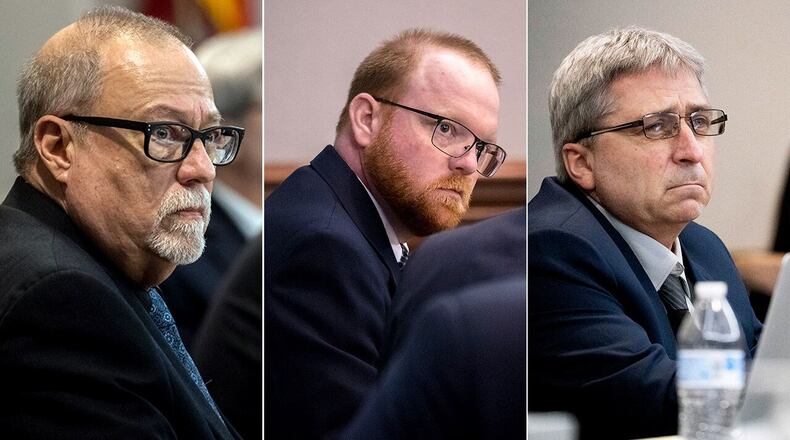BRUNSWICK — The federal judge presiding over the upcoming hate crimes trial of three white men convicted of murdering Ahmaud Arbery said Monday she plans to summon a jury pool of roughly 1,000 people scattered across an expansive area that covers 43 Georgia counties.
U.S. District Court Judge Lisa Godbey Wood told prosecutors and defense attorneys at a pretrial hearing that she was granting their joint request to cast a wider net for potential jurors.
Jury selection in the federal case is scheduled to begin Feb. 7. Attorneys had argued in legal filings it could be tough to seat an impartial federal jury so soon after the same three defendants were found guilty of murder in state court the day before Thanksgiving.
“I think the reasons set forth on both sides are extremely valid,” Wood said, adding: “It's a case that has received so much pretrial publicity.”
The judge said she plans to have about 1,000 jury duty notices and questionnaires mailed to people living throughout the federal court system’s Southern District of Georgia, which covers 43 of Georgia’s 159 counties.
The Southern District has a population of about 1.6 million people, with Savannah and Augusta being its largest cities. Its farthest community from the courthouse is rural Wilkes County, located more than 210 miles north of Brunswick.
Father and son Greg and Travis McMichael and their neighbor, William “Roddie” Bryan, are scheduled to be sentenced in the state’s murder case Jan. 7, a month before the federal trial begins. Their murder convictions carry a mandatory life sentence. The question for the judge is whether they will serve life in prison with or without a chance of parole.
A Glynn County jury in November found all three guilty of murder and other crimes in the Feb. 23, 2020, killing of Arbery. Bryan recorded cellphone video of Travis McMichael blasting the 25-year-old Black man with a shotgun after Arbery spent several minutes running as the three men chased him in pickup trucks.
Now the McMichaels and Bryan face hate crime charges at the federal level that allege they violated Arbery’s civil rights, unjustly pursuing and threatening him on a public street, because he was Black.
The judge said Monday she plans to keep the federal trial in Brunswick, noting the families of Arbery and the defendants live there, as do many of the witnesses being called to testify.
Typically in a federal trial, a jury would be pulled from Glynn County, which includes Brunswick, and six neighboring counties.
Arbery's father, Marcus Arbery Sr., told reporters outside the courthouse he's fine with a jury coming from a wider area of the state.
“It don’t matter because the evidence is overwhelming,” he said.
The McMichaels armed themselves with guns and jumped in a pickup truck after they spotted Arbery running past their home on a Sunday afternoon last year. They later told police they suspected he was a burglar, though they did not see him committing any crimes.
Bryan joined the chase in his own truck, telling police he used the vehicle to force Arbery into a ditch and cut off his escape from the subdivision. He used his cellphone to record video of Travis McMichael shooting Arbery as he tried to run around the McMichaels’ idling truck.
Travis McMichael testified he shot Arbery in self-defense after the running man attacked him and tried to grab his gun. Defense attorneys said the three men had reasonable grounds to suspect Arbery was a criminal and wanted only to detain him until police could arrive.
At the time of his death, Arbery had enrolled at a technical college and was preparing to study to become an electrician like his uncles.
Attorneys on both sides in the federal case have said they hope selecting a jury from a wider area will help avoid the slow-paced grind that made jury selection last 2 ½ weeks before the state trial could begin.
The state’s jury pool was drawn exclusively from Glynn County, where Arbery’s death had dominated news reports and social media feeds. Most potential jurors arrived at the courthouse already knowing basic facts about the case, and many were dismissed for having strong opinions.
The judge agreed with attorneys to send a 14-page questionnaire to potential jurors along with their jury duty notices. Attorneys will be able to review them before jury selection begins.

